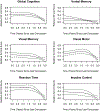Concussion History and Cognitive Function in a Large Cohort of Adolescent Athletes
- PMID: 30230912
- PMCID: PMC6940017
- DOI: 10.1177/0363546518798801
Concussion History and Cognitive Function in a Large Cohort of Adolescent Athletes
Abstract
Background: The incidence of reported concussions in the adolescent population is increasing, yet research on the effects of concussions in this population is minimal and inconclusive.
Purpose: To assess the association between concussion and performance on a cognitive test battery.
Study design: Cross-sectional study; Level of evidence, 3.
Methods: Using multivariate models, the authors assessed the association between concussion and performance on a cognitive test battery among 5616 high school and junior high school athletes. The researchers utilized a global cognitive score and scores for 5 domains: verbal memory, visual memory, visual motor, reaction time, and impulse control. Each cognitive score was converted to a z score with the mean and SD of the nonconcussed population. Results from each model were then interpreted as change in the standardized unit score. In the models, concussion was evaluated as ever having a concussion, number of concussions, time since last concussion, and age at first concussion.
Results: Ever having a concussion was associated with a mean decrease of 0.11 standardized units (95% CI, -0.20 to -0.01) on the global cognitive score and lower scores in all cognitive domains. Each additional concussion was associated with lower scores on global cognitive function (effect estimate, -0.06; 95% CI, -0.11 to -0.02), verbal memory, visual memory, and impulse control. Concussion in early childhood was associated with lower global cognition (effect estimate, -0.05; 95% CI, -0.08 to -0.01), visual memory, and motor visual scores as compared with concussions in later childhood. The associations between time since last concussion and cognitive test scores were nonlinear, and on all tests, lower scores were observed even ≥1 year after the concussion.
Conclusion: On the basis of objective performance metrics for cognitive function, concussions had a more persistent effect on cognitive function than previously thought. The age at which an individual has his or her first concussion may be an important factor in determining long-lasting cognitive effects.
Keywords: adolescents; concussion; duration of effects; mTBI; neurocognitive testing.
Figures

Similar articles
-
American Medical Society for Sports Medicine position statement: concussion in sport.Br J Sports Med. 2013 Jan;47(1):15-26. doi: 10.1136/bjsports-2012-091941. Br J Sports Med. 2013. PMID: 23243113 Review.
-
Concussion symptoms and neurocognitive performance of high school and college athletes who incur multiple concussions.Am J Sports Med. 2013 Dec;41(12):2885-9. doi: 10.1177/0363546513499230. Epub 2013 Aug 19. Am J Sports Med. 2013. PMID: 23959963
-
Are there differences in neurocognitive function and symptoms between male and female soccer players after concussions?Am J Sports Med. 2013 Dec;41(12):2890-5. doi: 10.1177/0363546513509962. Epub 2013 Nov 6. Am J Sports Med. 2013. PMID: 24197616
-
A multicenter, longitudinal survey of headaches and concussions among youth athletes in the United States from 2009 to 2019.J Headache Pain. 2023 Feb 8;24(1):6. doi: 10.1186/s10194-022-01528-3. J Headache Pain. 2023. PMID: 36755244 Free PMC article.
-
History of Sport-Related Concussion and Long-Term Clinical Cognitive Health Outcomes in Retired Athletes: A Systematic Review.J Athl Train. 2020 Feb;55(2):132-158. doi: 10.4085/1062-6050-297-18. Epub 2020 Jan 14. J Athl Train. 2020. PMID: 31935139 Free PMC article.
Cited by
-
Saliva microRNA Biomarkers of Cumulative Concussion.Int J Mol Sci. 2020 Oct 20;21(20):7758. doi: 10.3390/ijms21207758. Int J Mol Sci. 2020. PMID: 33092191 Free PMC article.
-
Influence of concussion history and age of first concussion on visio-vestibular function.J Sci Med Sport. 2022 Sep;25(9):715-719. doi: 10.1016/j.jsams.2022.06.006. Epub 2022 Jun 21. J Sci Med Sport. 2022. PMID: 35821211 Free PMC article.
-
Association between days for concussion recovery and initial specialty clinic evaluation within 48 hours.BMC Sports Sci Med Rehabil. 2024 Apr 2;16(1):75. doi: 10.1186/s13102-024-00866-w. BMC Sports Sci Med Rehabil. 2024. PMID: 38566116 Free PMC article.
-
Symptom clusters and resting cardiovascular autonomic measures in adolescents: From acute concussion to recovery.Physiol Rep. 2024 Nov;12(21):e70114. doi: 10.14814/phy2.70114. Physiol Rep. 2024. PMID: 39489529 Free PMC article.
-
Position-based assessment of head impact frequency, severity, type, and location in high school American football.Front Bioeng Biotechnol. 2025 Jan 14;12:1500786. doi: 10.3389/fbioe.2024.1500786. eCollection 2024. Front Bioeng Biotechnol. 2025. PMID: 39877265 Free PMC article.
References
-
- Alexander DG, Shuttleworth-Edwards AB, Kidd M, Malcolm CM. Mild traumatic brain injuries in early adolescent rugby players: long-term neurocognitive and academic outcomes. Brain Injury. 2015;29(9):1113–1125. - PubMed
-
- Allen BJ, Gfeller JD. The Immediate Post-Concussion Assessment and Cognitive Testing battery and traditional neuropsychological measures: a construct and concurrent validity study. Brain Inj. 2011;25(2):179–191. - PubMed
-
- Anderson V, Catroppa C, Morse S, Haritou F, Rosenfeld J. Functional plasticity or vulnerability after early brain injury? Pediatrics. 2005; 116(6):1374–1382. - PubMed
-
- Anderson V, Moore C. Age at injury as a predictor of outcome following pediatric head injury: a longitudinal perspective. Child Neuropsychol. 1995;1(3):187–202.
-
- Anderson VA, Anderson P, Northam E, Jacobs R, Catroppa C. Development of executive functions through late childhood and adolescence in an Australian sample. Dev Neuropsychol. 2001;20(1):385–406. - PubMed
Publication types
MeSH terms
Grants and funding
LinkOut - more resources
Full Text Sources
Other Literature Sources
Medical

